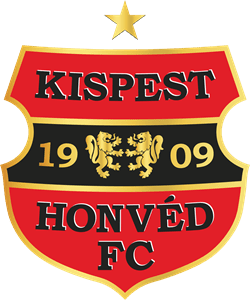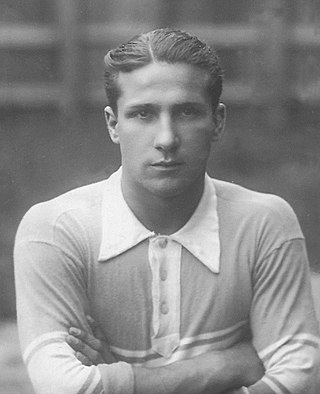
Gerhard "Gerd" Müller was a German professional footballer. A prolific striker, especially in and around the six-yard box, he is widely regarded as one of the greatest goalscorers and players in the history of the sport. With success at club and international level, he is one of nine players to have won the FIFA World Cup, the UEFA Champions League and the Ballon d'Or.

Ferenc Puskás was a Hungarian footballer and manager, widely regarded as one of the greatest players of all time and the sport's first international superstar. A forward and an attacking midfielder, he scored 84 goals in 85 international matches for Hungary and later played four international matches for Spain as well. He became an Olympic champion in 1952 and led his nation to the final of the 1954 World Cup. He won three European Cups, ten national championships and eight top individual scoring honors. Known as the "Galloping Major", in 1995, he was recognized as the greatest top division scorer of the 20th century by the IFFHS. Scoring 806 goals in 793 official games during his career, he is the seventh top goal scorer of all time by the RSSSF.

Budapest Honvéd Football Club, commonly known as Budapest Honvéd or simply Honvéd, is a Hungarian sports club based in Kispest, Budapest, with the colours of red and black. The club is best known for its football team. Honvéd means the Homeland Defence. Originally formed as Kispest AC, they became Kispest FC in 1926 before reverting to their original name in 1944.

József Bozsik was a Hungarian footballer who played as a central midfielder. He spent his entire club career at his hometown club, Budapest Honvéd. Bozsik was a key member of the legendary Golden Team as he represented Hungary in various international tournaments. Honvéd named their stadium, Bozsik József Stadion, after him.

Sándor Péter Kocsis was a Hungarian footballer who played for Ferencvárosi TC, Budapest Honvéd, Young Fellows Zürich, FC Barcelona and Hungary as a striker. During the 1950s, along with Ferenc Puskás, Zoltán Czibor, József Bozsik and Nándor Hidegkuti, he was a member of the Mighty Magyars. After the 1956 Hungarian Revolution, he moved to Spain where he became a member of the FC Barcelona team of the late 1950s.

Kurt Roland "Kurre" Hamrin was a Swedish professional footballer who played as a winger. He began his career in his home country with AIK, but later played for several Italian clubs, most notably Fiorentina, with whom he won two Coppa Italia titles, a Cup Winners' Cup, and a Mitropa Cup over nine years, making over 350 appearances for the club and scoring over 200 goals in all competitions. He also represented AC Milan, with whom he won a Serie A title and the European Cup. A prolific goalscorer, he is currently the eighth highest goalscorer of all time in Italy's Serie A, with 190 goals.

Imre Schlosser was a Hungarian footballer of Danube Swabian ancestry who played as a forward. He still holds the record as the highest goalscorer in the history of the Hungarian National Championship. He was also the first player from outside the British Isles to break the record of most association football international caps.
The European International Cup of Nations was an international football competition held by certain national teams from Central Europe & South Europe between 1927 and 1960. There were competitions for professional and amateur teams. Participating nations were: Italy, Austria, Czechoslovakia, Hungary, Switzerland, Poland, Romania, and Yugoslavia. Poland and Romania only competed in the amateur competition.

Ferenc Bene was a Hungarian footballer who played as a striker for Újpesti Dózsa and Hungary.

Zoltán Czibor was a Hungarian footballer who played for several Hungarian clubs, including Ferencváros and Budapest Honvéd, and the Hungary national team before joining CF Barcelona. Czibor played as a left-winger or striker and was notable for having a powerful shot, good pace and excellent ball control. During the 1950s he was part of the Magical Magyars, reaching the World Cup final with them in 1954. After the 1956 Hungarian Revolution he moved to Spain where he became a prominent member of the successful FC Barcelona team of the late 1950s. After three seasons at Barcelona, he joined their local rivals Español for the 1961–62 season. After brief spells at FC Basel, Austria Wien and Primo Hamilton FC, he retired as a professional footballer and returned to Hungary. He died there in 1997, aged 68.

Luis Artime is an Argentine former footballer, who played as a striker, and scored more than 1,000 goals during his career. His son Luis Fabián Artime is also a retired Argentine footballer who played in the 1990s.

Angelo Schiavio was an Italian footballer who played as a forward. Schiavio spent his entire career with Bologna, the club of the city where he was born and died; he won four league titles with the club, and is the team's all-time highest goalscorer. He won the 1934 FIFA World Cup with Italy, finishing as the tournament's second highest goalscorer; winning the 1927–30 Central European International Cup & 1933–35 Central European International Cup and he also won a bronze medal with Italy at the 1928 Summer Olympics. Following his retirement, he later also managed both Bologna and the Italy national side.

György Sárosi was a Hungarian footballer. Sárosi was a complete footballer renowned for his versatility and technique among other things, and he played in several positions for Ferencváros and the Hungary national team. Essentially a second striker, he could also operate in midfield or central defence, and he helped Ferencváros win five Hungarian league titles between 1932 and 1941. He is considered one of the greatest players of the pre-war era.

Lajos László Détári is a Hungarian football manager and former player who played as a midfielder. At the height of his career (1984–1994), he was a well-respected player throughout Europe, winning "Player of the Year" titles in Hungary, Greece and Switzerland.

István Avar was a footballer and manager of German descent who at various times competed for both Hungary and Romania as a forward. He played for Újpest FC, most famous for playing for the Hungary national team in the 1934 World Cup. He was born in Arad, Hungary, which became part of Romania in 1920.
Franz "Bimbo" Binder was an Austrian football player and coach who played as a forward. Internationally he represented the Austria national team and, during the Anschluss, the Germany national team. He played internationally immediately following the Austrian "Wunderteam" of 1931-32.

Ferenc Deák was a Hungarian footballer who played as a striker for clubs such as Szentlőrinci AC, Ferencváros and Budapesti Dózsa, and who played internationally for Hungary, scoring 29 goals in just 20 caps. His nickname was Bamba. With over 795 goals in official matches scored during his career, the bulk of which came during World War II, Deák is the seventh top goalscorer of all time. Including friendly and unofficial matches, he is also the seventh top goalscorer of all time with over 1375 goals in just 839 matches.

Iuliu Bodola was a Romanian-Hungarian footballer who played as a striker. He represented both the Romania and Hungary national team at internationally level. His nickname was Duduş/Dudus. He is Romania's third all-time top goalscorer, and he is also the all-time top goal scorer of the Balkan Cup.
Budapest Honvéd Football Club is a professional football club based in Budapest, Hungary.
















